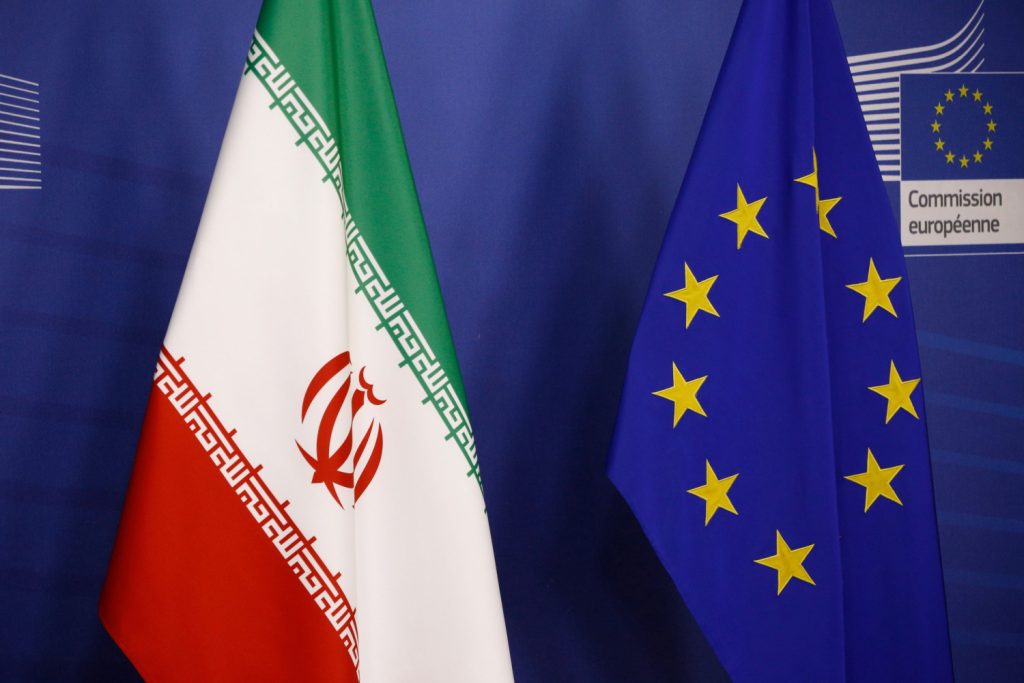Australia/Israel Review
Europa Europa: Europe’s “Tyranny of Distance” on Iran
Jan 30, 2023 | Alex Benjamin

As I write this, the European Parliament is considering a resolution to designate Iran’s Islamic Revolutionary Guard Corps (IRGC) as a terrorist organisation.
Welcome news if the resolution passes, as expected. [It did. Ed.] Still, I can’t help ask: what took you so long?
As I was thinking about this question, Lenin’s dictum “Probe with bayonets, if you find mush proceed, if you find steel withdraw” came to mind.
Most of the EU countries involved in negotiations with Iran have the twin benefits of distance and no real existential skin in the game. It is therefore much easier to offer mush – or make deals and hope for the best – when Iran is thousands of miles away from your borders.
Israel does not have this luxury. A nuclear strike on the Jewish state would take a matter of minutes.
Much of the EU’s probing or negotiating is done from this semi-detached position, with no real-time repercussions for your population, yet there is constant European consternation or frustration with Israel for its supposed obduracy towards Iran.
This frustration seems to me akin to a class captain at a school trying to reason with and rehabilitate the school bully over a long period, whilst the kid being bullied faces being harassed day-in-day-out. Ask that bullied kid how he feels as you try to negotiate a long-term solution, when his daily life is under constant assault.
Iran is directly involved in nearly every aspect of Israel’s daily foreign policy challenges. Nuclear threat from Iranian enrichment? Check. Missile and incursion threats on the northern border from Hezbollah? Check. Threats to Israel’s emerging energy security via its gas fields? Check. Regular random rocket attacks on the main Israeli population centres from Gaza by Iran-supported terror groups that openly seek to kill and maim? Check. Terror attacks in Israeli towns emanating from the West Bank groups funded and encouraged by Iranian proxies? Check.
Israeli Prime Ministers – from Peres to Sharon, Netanyahu to Bennett to Lapid, and back to Netanyahu again – have all been remarkably consistent. You won’t find a cigarette paper width of difference between them when it comes to Iran. And they have repeatedly made this case to European capitals.
During his premiership, Lapid, eminently mild-mannered with a seasoned journalistic temperament, stood in front of Israel’s stealth bombers and warned, “If Iran continues to test us, it will discover Israel’s long arm and capabilities.”
Sharon, a former war hero turned statesman, who disengaged from Gaza and took unprecedented steps for peace, was likewise unequivocal about the threat from Iran. Netanyahu we all know as a great showman on the international stage, using his flipcharts and red pen to present the case against Iran at the UN.
That reminds me – harking back to my initial point about Europeans feeling Iran is too distant to be a serious problem for them – Peres used to ask his counterparts in whatever capital he was visiting to calculate the missile distance from Teheran to there. I wish I could say the tactic worked. But the distances involved were perhaps a leap of imagination too far for some – and sometimes they apparently just didn’t care.
Ironically, it is the Ukraine War that has brought the Iran threat into immediate focus in Europe. Iranian drones and other weapons supplied to Russian forces are wreaking havoc on the battlefield and are targeting, and in many cases destroying Ukrainian infrastructure. Iran is now engaged in a proxy war on European soil. Of course, the protests in Iran have also galvanised public opinion.
Israel, in the meantime, is engaged in a very delicate balancing act. It stands with Ukraine, but it cannot afford to alienate Moscow – whose “blind eye” towards Israel and its occasional strikes within Syria is crucial, as Jerusalem seeks to counter Iran’s hateful and deadly intent to militarily encircle the Jewish State.
There are some capitals and countries which find such a tough, active, sometimes covert, military stance unbefitting a democratic state. But like that kid in the playground, Israel does not have the luxury of taking a rarefied philosophical approach as it fights a daily struggle for existence and basic physical security.
To go back to Lenin, in Israel there is no mush in terms of security policy – only steel. For the foreseeable future, there can be no other way, and no new, old, or conceivable government in Israel will ever tell you otherwise.
Will Europe finally listen? Or will it tokenistically designate the IRGC, but avoid serious sanctions and forget the protests and Iranian drones when the opportunity to do much more presents itself? Let’s just say I won’t be rushing down to the bookies anytime soon to place a bet on the former.






